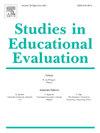同伴评估设计对人际交往过程的影响:系统回顾
IF 2.6
2区 教育学
Q1 EDUCATION & EDUCATIONAL RESEARCH
引用次数: 0
摘要
同伴评价可以对学生的学习产生非常积极的影响。然而,它也带来了一些挑战,如信任问题、对其公平性的担忧、不适应感等。众所周知,同伴互评的人际交往过程会影响其结果。然而,如何实施同伴互评来避免这种情况的发生却不太清楚。在本文中,我们回顾了 27 项研究,这些研究调查了同伴互评的教学设计要素如何影响人际交往过程。我们在 Scopus、PsycINFO 和 Eric 网站上进行了文献检索,检索字符串由三部分组成,关键词分别是:(1)同伴互评;(2)教育情境;(3)人际交往过程。根据纳入标准对检索到的 14,552 条记录进行了筛选,最终有 27 项研究被纳入并通过叙事综合法进行了分析。结果显示,最常研究的三个设计要素是隐私、形式和培训。隐私似乎对一些人际交往过程有积极影响,但对另一些则有不利影响。关于形式,研究表明,增加指导量对人际交往过程有积极影响,但由于研究设计的局限性,对这一结果的解释必须谨慎。使用培训似乎有利于最大限度地减少人际交往过程的负面影响。最后,对于其他三个设计要素,我们无法得出结论,因为这三个要素只在一项研究中进行了调查,而且研究设计也很薄弱。这些结果使我们能够为实施同伴评估的从业人员提出重要建议,并找出差距和需求,为今后的研究提供参考。本文章由计算机程序翻译,如有差异,请以英文原文为准。
The impact of peer assessment design on interpersonal processes: A systematic review
Peer assessment can have a very positive impact on students’ learning. However, it also poses some challenges such as trust issues, concerns about its fairness, feelings of discomfort, etc. It is known that the interpersonal processes of peer assessment can affect its outcomes. However, it is less clear how peer assessment should be implemented to prevent this. In this article, we reviewed 27 studies that have investigated how the instructional design elements of peer assessment influence interpersonal processes. A literature search was carried out on Scopus, PsycINFO, and Eric with a search string composed of three parts with keywords linked to (1) peer assessment, (2) educational contexts, and (3) interpersonal processes. The 14,552 retrieved records were screened in terms of the inclusion criteria, which resulted in 27 studies being included and analysed through a narrative synthesis. The results revealed that the three most commonly-investigated design elements were privacy, format, and training. Privacy seems to have a positive impact on some interpersonal processes, but a detrimental effect on others. Concerning format, studies suggest that increased amounts of guidance are associated with a positive impact on interpersonal processes, but this result must be interpreted with caution due to the limitations of the studies’ research designs. The use of training seems to be beneficial in minimising the negative effects of interpersonal processes. Finally, no conclusion could be drawn on three other design elements that were only investigated in one study each, and with weak research designs. These results allowed us to draw important recommendations for practitioners implementing peer assessment and to identify gaps and needs that could inform future research.
求助全文
通过发布文献求助,成功后即可免费获取论文全文。
去求助
来源期刊

Studies in Educational Evaluation
Multiple-
CiteScore
6.90
自引率
6.50%
发文量
90
审稿时长
62 days
期刊介绍:
Studies in Educational Evaluation publishes original reports of evaluation studies. Four types of articles are published by the journal: (a) Empirical evaluation studies representing evaluation practice in educational systems around the world; (b) Theoretical reflections and empirical studies related to issues involved in the evaluation of educational programs, educational institutions, educational personnel and student assessment; (c) Articles summarizing the state-of-the-art concerning specific topics in evaluation in general or in a particular country or group of countries; (d) Book reviews and brief abstracts of evaluation studies.
 求助内容:
求助内容: 应助结果提醒方式:
应助结果提醒方式:


